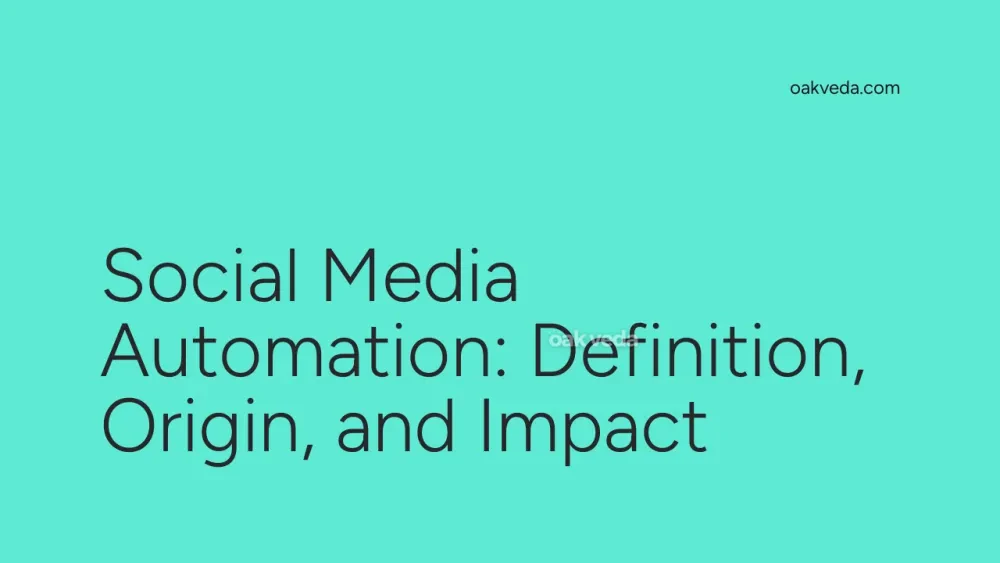
What is Social Media Automation?
Social media automation refers to the use of software tools and technologies to streamline, schedule, and manage social media activities across multiple platforms. This process involves automating tasks such as content posting, engagement tracking, and performance analysis, allowing businesses and individuals to maintain a consistent online presence without constant manual intervention.
Origin and Development of Social Media Automation
The concept of social media automation emerged in the early 2010s as social media platforms gained popularity and businesses recognized the need for efficient management of their online presence. Early tools focused primarily on scheduling posts, but as social media marketing became more complex, automation solutions evolved to include features like content curation, analytics, and cross-platform management.
How Social Media Automation Works
Social media automation typically involves the following steps:
- Content Creation: Users create or curate content in advance.
- Scheduling: Posts are scheduled for optimal times across various platforms.
- Publishing: Automated tools publish content at predetermined times.
- Engagement Monitoring: Some tools track likes, comments, and shares.
- Analytics: Automated reports provide insights on post performance.
Advanced automation systems may also include features like sentiment analysis, chatbots for customer service, and AI-driven content recommendations.
Types of Social Media Automation
There are several types of social media automation:
- Post Scheduling: Automating the timing and distribution of content.
- Content Curation: Automatically finding and sharing relevant third-party content.
- Social Listening: Monitoring brand mentions and industry trends.
- Chatbots: Automating customer interactions and support.
- Analytics and Reporting: Generating automated performance reports.
Popular Examples of Social Media Automation Tools
- Hootsuite: Offers comprehensive social media management and scheduling.
- Buffer: Known for its user-friendly interface and post scheduling features.
- Sprout Social: Provides in-depth analytics and team collaboration tools.
- Later: Specializes in visual content scheduling, particularly for Instagram.
- MeetEdgar: Focuses on content recycling and category-based scheduling.
Impact of Social Media Automation on Social Media Culture
Social media automation has significantly impacted digital culture:
- Increased Content Volume: Automation enables more frequent posting, leading to a saturated social media landscape.
- 24/7 Presence: Brands can maintain an active online presence around the clock.
- Standardized Messaging: Automation helps maintain consistent brand voice across platforms.
- Data-Driven Strategies: Automated analytics allow for more informed decision-making.
However, the rise of automation has also led to concerns about the authenticity of social media interactions and the potential for spam-like behavior.
Controversies Surrounding Social Media Automation
While automation offers numerous benefits, it's not without controversy:
- Lack of Authenticity: Over-reliance on automation can make brand interactions feel impersonal.
- Content Saturation: Automated posting can contribute to information overload.
- Algorithm Changes: Platforms may penalize overly automated content.
- Privacy Concerns: Data collection for automation raises questions about user privacy.
How Brands and Influencers Use Social Media Automation
Brands and influencers leverage social media automation to:
- Maintain consistent posting schedules across multiple platforms
- Repurpose content efficiently
- Analyze performance metrics to refine strategies
- Engage with followers through automated responses and chatbots
- Identify trending topics and hashtags for timely content creation
Successful users of automation strike a balance between automated efficiency and genuine human interaction.
Future Trends in Social Media Automation
The future of social media automation is likely to include:
- AI-Driven Content Creation: Advanced AI generating personalized content.
- Predictive Analytics: Tools forecasting optimal posting times and content types.
- Cross-Platform Integration: Seamless automation across emerging social platforms.
- Enhanced Personalization: More sophisticated targeting based on user behavior.
- Voice and Visual Search Optimization: Automation adapting to new search technologies.
FAQs about Social Media Automation
-
Is social media automation suitable for all businesses? While beneficial for many, it's important to balance automation with genuine engagement.
-
Can social media automation completely replace human involvement? No, human oversight and authentic interaction remain crucial for successful social media strategies.
-
How does social media automation affect organic reach? When used strategically, it can improve reach by ensuring consistent, timely posting.
-
What are the costs associated with social media automation tools? Costs vary widely, from free basic tools to enterprise-level solutions costing hundreds per month.
-
How can businesses measure the ROI of social media automation? By tracking metrics like engagement rates, time saved, and conversion rates attributed to automated posts.
In conclusion, social media automation has become an indispensable tool in the digital marketer's arsenal. When used judiciously, it can significantly enhance efficiency, consistency, and reach. However, it's crucial to remember that automation should complement, not replace, genuine human interaction and creativity in social media strategy. As the digital landscape evolves, so too will the capabilities and applications of social media automation, making it an exciting area to watch in the coming years.
You may be interested in:
- Loop: Definition, Origin, and Impact on Social Media
- Natural Language Processing: Definition, Origin, and Impact
- Social Proof: Definition, Origin, and Impact on Digital Marketing
- Instagram Carousel: Definition, Origin, and Impact
- Coded: Definition, Origin, and Impact on Social Media
- Extra: Definition, Origin, and Impact on Social Media

